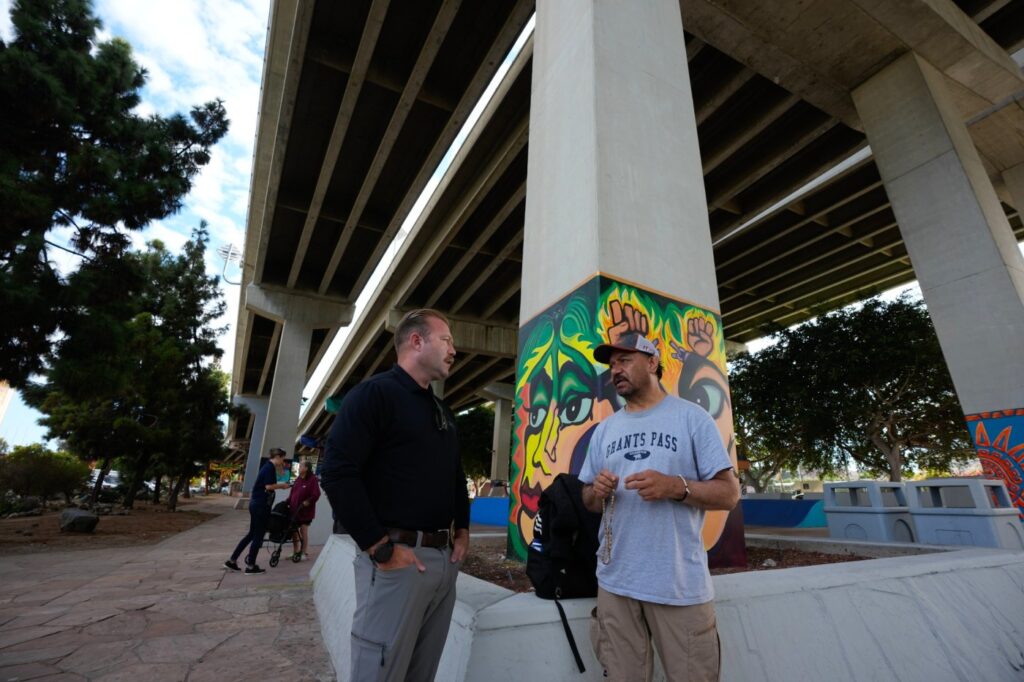
San Diego police have expanded their approach to tackling addiction by launching a dedicated team aimed at assisting individuals struggling with substance abuse. The newly formed Intervention Services Team, which began its operations in September 2024, is focused on connecting residents with drug and alcohol treatment programs, rather than solely enforcing the law.
On a recent Tuesday morning, a group of five officers set out in search of a man they hoped to help. Their mission was uncertain; finding him was no guarantee, and even if they did, there was no assurance he would agree to enter a detox program. This initiative reflects a shift in the police department’s approach to addiction, moving from a punitive response to one centered on treatment.
Carlos Navarro, a police officer with over 25 years of experience, emphasized the importance of this new approach. He noted that in the past, the typical response to drug-related incidents involved immediate arrests. Now, the focus is on building relationships with individuals in need of help. Navarro, along with his colleagues, has seen firsthand the toll addiction takes on individuals and the community.
The economic rationale behind this initiative is compelling. Many individuals the Intervention Services Team encounters have extensive criminal records, with some racking up over 100 arrests. A police sergeant estimated that one individual recently cost the city approximately $250,000 in emergency response services. Research from Point Loma Nazarene University and the Economic Roundtable highlights that a small number of individuals can impose significant financial burdens on taxpayers.
Despite the financial incentives for effective intervention, persuading someone to change their lifestyle remains a complex challenge. Building trust and rapport takes time, often requiring multiple interactions before individuals are ready to commit to treatment.
The officers began their day at Chicano Park in the Barrio Logan neighborhood, where they hoped to find the man. Their unmarked vehicles and casual attire helped them blend in, making them less intimidating to the community members they sought to help. Although the individual they were searching for was not immediately visible, the team engaged with others in the park, assisting those who needed rides to community events or support services.
After receiving a tip that the man might be at a local hospital, the team quickly split up to pursue multiple leads. Some officers drove one individual to a community resource fair, while others transported a man seeking help for his intoxication to the McAlister Institute’s Recovery and Bridge Center. This small facility offers short-term detox beds and is a critical resource in San Diego’s effort to combat addiction.
The creation of the Intervention Services Team was largely driven by the efforts of David McGowan, who previously operated as a one-man intervention unit. His dedication to helping individuals in crisis laid the groundwork for expanding the team to five officers. McGowan is now an acting sergeant with the department’s Homeless Outreach Team.
While the team aims to provide immediate support, they are also grappling with a shortage of long-term detox options. As of last year, San Diego County had only 78 beds available for longer-term detox that accept Medi-Cal, the state’s health insurance for low-income residents. This scarcity can lead to long wait times, which often results in individuals relapsing or disappearing from the system altogether. Efforts are underway to increase capacity, with recent expansions bringing the total number of available beds to around 100.
During a visit to UC San Diego Health’s Hillcrest Medical Center, officers hoped to connect with the man they had been searching for all morning. After a brief period inside the hospital, they emerged with positive news: the man had agreed to seek treatment.
The officers engaged him in conversation, discussing his immediate needs and plans for the future. Despite his initial reluctance, he expressed a desire to meet the team later to begin his recovery journey, highlighting the slow but vital process of building trust and encouraging individuals to take steps towards sobriety.
As the team continues its work, they face challenges not only in terms of outreach but also in sustaining funding for similar initiatives. Potential cuts at the city, county, and federal levels pose a threat to critical services aimed at assisting those in need. Similar programs, such as those operated by the nonprofit People Assisting The Homeless (PATH), may face closure without additional financial support.
The San Diego Police Department’s Intervention Services Team exemplifies a proactive approach to addiction treatment, seeking to address the root causes of substance abuse while navigating the complexities of human behavior. As they strive to make a difference in the lives of individuals struggling with addiction, the team remains committed to breaking down barriers and fostering a compassionate response to a pressing social issue.







